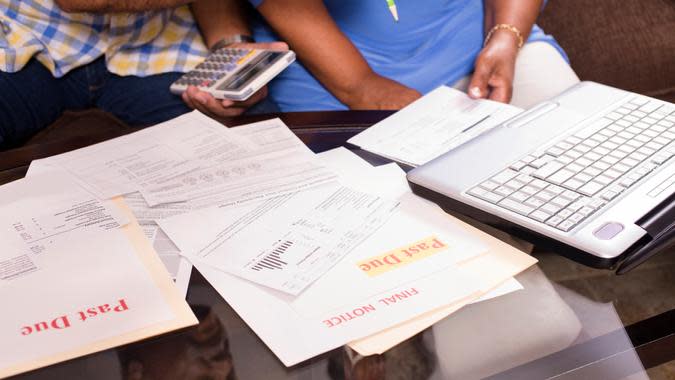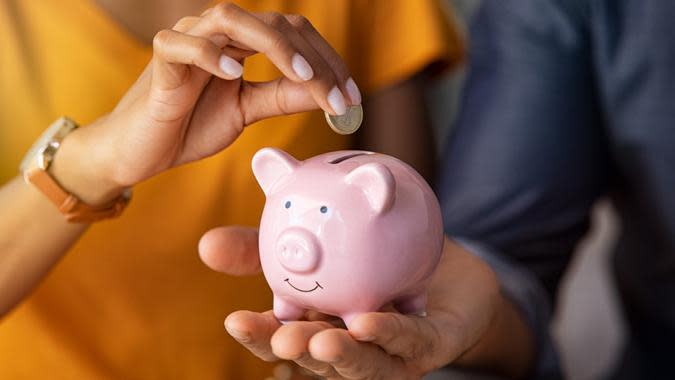Overhaul Your Finances With This 7-Day Financial Detox

There's no shortage of detox diet trends that are supposed to improve your health -- from eliminating sugar to eating only plants or even drinking only water (and eating nothing) for a few days. And there's a lot of debate about whether detox diets are beneficial. But for some people, they can be a good way to spur better long-term habits.
See: Do You Have Too Much Money in Your Checking Account?
Tax Season: 3 Ways Smart People Save Money When Filing Their Taxes
Save More: 10 Things To Stop Buying in 2023
The same could be said of a financial detox. If you've been struggling to get a handle on your finances, you might need a jump-start to get back on the right track and take control of your money. Click to read more about signs that you should start taking your finances more seriously.

Day 1: Get Clear on Where You Want Your Money To Go
It might seem that the logical first step to improving your financial well-being would be creating a budget. But Michelle Singletary, author of "The 21-Day Financial Fast" and award-winning Washington Post columnist, cautioned against this. "That will stress you out," she said. Which means you could quickly give up on your detox.
Instead, spend your first day finding inspiration that will help you remember why you want to improve your finances. "Just think about this: You work hard for your money. What do you have to show for it?" Singletary said. Get clear on what you value and how you can align your spending with those values.
For Singletary and her husband, what they've wanted to be able to do with their money is leave a legacy, give to others and put their three children through college debt-free. They also want to be able to retire someday and relax. "That charges us up," she said. If you can figure out where you want your money to go, you'll be more motivated to take action. Start every week by taking time to do this -- to talk to your spirit, as Singletary calls it.
Take Our Poll: What Are Your Financial Priorities in 2023?

Day 2: Clear Out Your Financial Clutter
Now it's time to work on detoxing your finances by getting organized. Start gaining control over your money by tackling those unopened bills or electronic statements that have been piling up.
Belinda Rosenblum, founder of Own Your Money financial coaching, recommends dedicating a short block of time to tackling some of the clutter. "Set the timer on your phone -- start with 30 minutes -- and focus on getting through a certain stack of paperwork," she said.
You can create a filing system for bills with a folder for each month, then file paperwork based on invoice dates. You also can create folders for taxes, insurance, debt and other areas of your financial life. However you get organized, the key to seeing lasting benefits is to set aside time each week from now on to go through bills and continue to streamline your financial life.

Day 3: Ditch Unwanted Subscriptions and Recurring Costs
Just like you would with a diet detox, identify things in your financial life that you should eliminate. "It's one thing to identify and eliminate the expenses you know about," said Carla Dearing, former head of product for FlexWage Solutions[x]. "But what about the ones you don't even notice? With automatic recurring costs like subscriptions, it's often a case of out of sight, out of mind -- but the charges do add up."
So, on day three of your detox, do a spending audit to pinpoint recurring expenses that can be cut. "This will probably involve examining past bank or credit card statements with a sharp eye -- not unlike the way you would read food labels closely to zero in on hidden sugar and fat in your diet," Dearing said. Make a list of unwanted subscriptions, then contact each company to cancel them. Or, as Dearing said, you could use an app such as Trim or Rocket Money to analyze your accounts, manage subscriptions and find savings for you.

Day 4: Simplify a Financial Task
By now, you should be starting to feel some of the benefits of your detox. To build upon your momentum, use this day to simplify a daunting financial task. "Unconsciously, we often blow out of proportion how difficult a task will be and how much time it will take," Rosenblum said. "In reality, you can usually break down a task into much smaller components and then allow yourself success at each step, culminating with successful completion of the full task."
For example, you might be considering refinancing your mortgage to get a lower rate, but feel overwhelmed by how difficult it seems. "But if you start with simplifying the need to contacting three mortgage brokers and getting quotes, then the task becomes doable," Rosenblum said. Pick a task you've been avoiding, break it down into small steps and tackle each step one-by-one. You can do this each week until you complete the task then find another financial task to tackle.

Day 5: Face Your Debt
Just like a diet detox might help you shed pounds, you can use a financial detox to start getting rid of debt that's been weighing you down. Pull out all of your credit card and loan statements and add up everything you owe. That big number might be frightening. "But that's OK," Singletary said. "Now you've faced the devil. Then figure out how to face your debt."
Singletary recommends identifying your debt with the smallest balance, then figuring out how much you can afford to put toward it each month. You can put the money you've saved from cutting unnecessary expenses on day three toward monthly payments. "When you get rid of the small [debts] first, you get charged up," she said. Then you're motivated to tackle bigger and bigger debts.

Day 6: Make a Weekend Entertainment Budget
If you started your financial detox on Sunday, it's now Friday. But that doesn't mean it's OK to start slacking. "When it comes to money, detoxing can be as simple as being mindful about the small ways we leak money unnecessarily," Dearing said. "Entertainment expenses can be a big culprit here, especially during the weekend when we're relaxing and inclined to treat ourselves."
A simple fix is to decide on a weekend entertainment budget and stick to it. "This may mean that movies are OK this weekend, but big concert tickets will have to wait until you've 'banked' several weekends' worth of entertainment funds," Dearing said. "Balance expensive weekends with low-cost or free weekends at the local aquarium or a public park."

Day 7: Clean Out Your Closet
You started the week by cleaning up some of your financial paperwork. So, you can end the week by cleaning out your closet -- yes, the one that contains your clothes. "Many of us have closets that are overstuffed with clothes we rarely wear," Dearing said. "Do a closet purge: Be ruthless and ditch anything you haven't worn in a year or more."
Paring down your wardrobe to things you truly want to wear will make dressing every day easier, she said. You might also come across things you haven't worn that you want to put back into your rotation -- which is a free way to update your wardrobe. For those things you don't want to keep, you can sell them through websites such as Thredup or at a consignment store. Or you can donate them.
To continue your detox, clean out other closets, your attic and garage on the weekends. Then profit by selling what you don't need.
More From GOBankingRates
This article originally appeared on GOBankingRates.com: Overhaul Your Finances With This 7-Day Financial Detox

